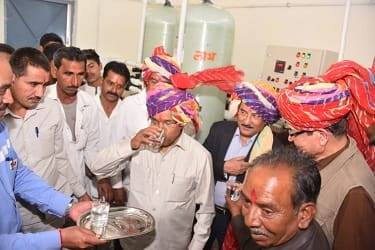Nagda, 25th February 2020: Safe and readily available water is important for public health. Improved water supply and sanitation, and better management of water resources, can boost countries’ economic growth and can contribute greatly to poverty reduction. United Nations Sustainable Development Goal target 6 calls for universal and equitable access to safe and affordable drinking water. Also the Jal Jeevan Mission announced by Prime Minister Narendra Modi, aims to provide tap water to all of households by 2024. In a bid to provide clean and safe drinking water to the villagers of Parmar khedi in Nagda, Madhya Pradesh, Grasim Industries has constructed a state of the art modern Reverse Osmosis (RO) plant at a cost of Rs 20 lacs with a capacity to process 1500 liters of drinking water in one hour.
Grasim Industries has been one of the pioneers of ‘Make in India’ success stories with its first viscose staple fibre manufacturing plant in Nagda. Right from its inception in 1947,Grasim Industries has been committed to giving back to society,leading to an impressive transformation of Nagda town and its surrounding villages.
On Sunday, 23 February 2020, Shri Thaawarchand Gehlot, Union Minister for Social Justice & Empowerment, Government of India, Shri Dilip Gurjar, MLA – Nagda and Khachrod along with Shri Dilip Gaur, Managing Director, Grasim Industries inaugurated and dedicated the first RO plant to the villagers of Parmarkedhi.
On the auspicious occasion, Mr Dilip Gaur, Managing Director, Grasim Industries said, “The welfare of the local community at Nagda is core to our strategy. For decades we have been investing in the economic and social transformation of the region. As part of our relentless efforts to improve living standards we are pleased to dedicate a new RO plant to the people of Parmarkedhi. Excellence in water management practices is integral to our commitment towards water stewardship. With the new RO plant in Parmarkedhi, we are confident of positively impacting several lives in the region by providing safe clean drinking water.”
In Parmarkedhi and surrounding villages, Grasim Industries has been actively supplying 70,000 liters drinking water through 14 tankers on daily basis from last 2 years. It has also installed 3 Water drinking tanks of 2000 liters for the benefit of villagers.
Grasim Industries has already constructed four dams in Nagda on the river Chambal, which benefits over 2,00,000 people. In the last three years, Grasim’s Pulp and Fibre business has reduced water consumption by over 50% through focused water management efforts.
Grasim Industries state-of-the-art technologies, such as membrane processes help in the clean-up and recycle of wastewater. These innovations improve the efficiency of processes, which allows reuse of water several times over and provides additional water to the villagers. Today, the plant meets daily water requirements of the entire city and kachrod along with railways through 30 billion liters storage capacity built by the company. Grasim Industries unrelenting focus has had a significant impact on numerous villagers residing in the plant vicinity.
Along with providing clean water, Grasim Industries has also been committed to community engagement in areas of education, healthcare, sustainable livelihood, infrastructure development and social reform. The community engagement program spans 55 villages and 25 urban slums, reaching out to over 1 lakh people. In healthcare, Grasim Industries every week provides free health services and medicines through Mobile Medical Van. In sanitation, it has supported the construction of individual toilets under “Swachh Bharat Abhiyan” drive.
Grasim Industries has also provided LED streetlights and school furniture, as well as conducted cattle vaccination and treatment camps in collaboration with veterinary departments. The women are also trained on tailoring skills, and stitching machines have been distributed to empower them.



